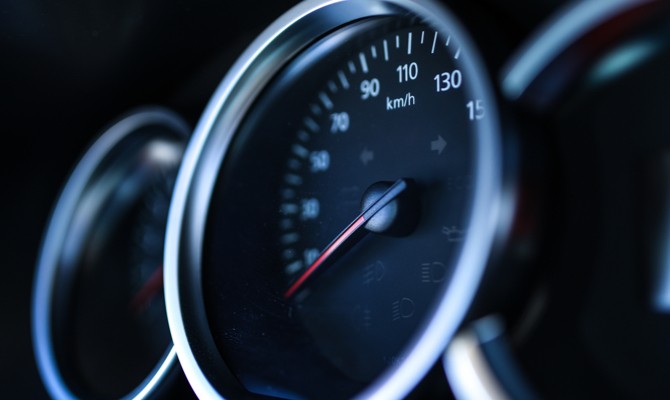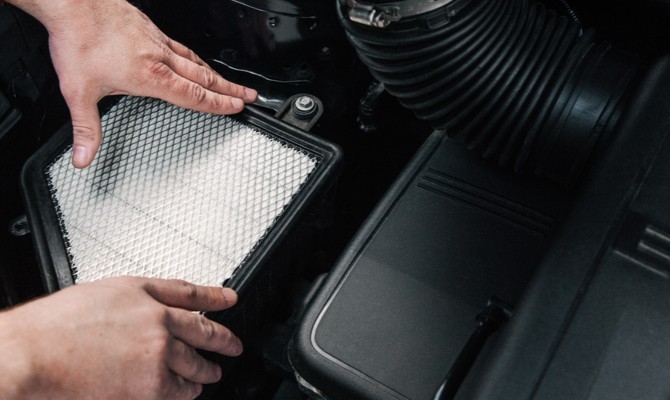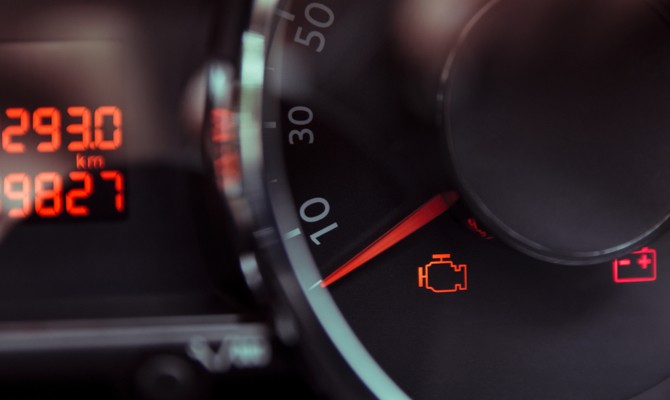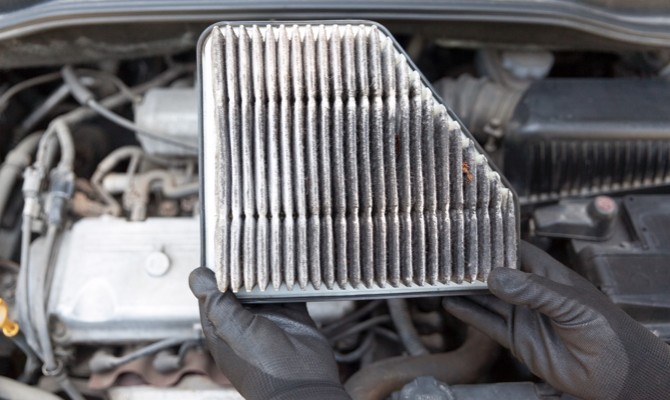Protecting Your Engine
Designed to allow clean air into the engine, the air filter is your vehicle’s first line of defense by preventing airborne contaminants such as dirt, dust and leaves from getting pulled into the engine compartment. Over time, the engine air filter can become dirty and lose its capacity for filtering the air going into the engine. If your air filter becomes clogged with dirt and debris, it can have a profound effect on the performance of your car’s engine. Read on to learn the signs and symptoms of a dirty engine air filter.
Lack of Acceleration

If it seems like your vehicle is slow to respond when you press down on the accelerator, it can be an indication that your engine isn’t getting enough clean air. A dirty air filter reduces the amount of clean air that is getting through to the engine, decreasing its power and performance. Replacing your dirty engine air filter with a new, clean one can improve the acceleration of your engine.
Poor Engine Performance

Engine misfires, rough idling and hard starts can all be traced to a clogged engine air filter. The dirty air filter restricts the air supply to the engine causing unburned fuel to form a soot residue that accumulates on the spark plug. This fouls the spark plug(s) and decreases their ability to deliver the spark needed for the combustion process. Changing the air filter and the affected spark plugs will restore the performance of your engine.
Strange Engine Noises
After driving your vehicle for a while, you learn what sounds are normal for your engine. If you start to hear coughing or popping noises coming from the engine compartment, or if your vehicle vibrates excessively, it can be a symptom of a dirty air filter that is damaging a spark plug. Replacing your air filter before it gets clogged ensures that you don’t also have to change the spark plugs.
Illuminated Check Engine Light

A dirty air filter is one of the things that can cause your Check Engine light to come on, caused by an inadequate supply of air to the engine that results in a buildup of carbon deposits. Have your mechanic scan your vehicle to track down the source of the problem, as it could be as simple as replacing the air filter.
Black Smoke Coming From Tailpipe
Another consequence of a dirty air filter is black smoke or flames coming from the exhaust pipe. The lack of clean air can result in the gas not completely burning during the combustion process. The unburned fuel then exits the vehicle through the tailpipe in the form of black, sooty smoke or flames at the end of the exhaust pipe.
Dirty Air Filter

A filter that is clogged with dirt is an obvious sign of a dirty air filter. Performing a visual inspection is an easy way to know if your air filter needs to be changed. A brand new air filter is white or off-white in color, while a dirty air filter will appear darker with the dirt and debris visible.
Reduced Gas Mileage
If you’re driving an older carbureted vehicle, a drop in fuel economy is a common sign of a dirty air filter. The carburetor mixes the air and fuel at the proper ratio for the combustion process. When your engine isn’t getting enough clean air, it may compensate by using more gas to produce the power it needs to perform. A clean air filter can help you save on gas.
Newer vehicles with fuel injection use the onboard computer to achieve the optimal air and fuel mix and automatically adjust the flow of fuel. The air filter doesn’t have much of an effect on the gas mileage of newer vehicles.
How Often to Change Engine Air Filter
While manufacturers vary on their recommendations on how often your air filter should be changed, if you notice any of these signs of a dirty air filter, it’s time to have your air filter inspected. Examining the air filter is something you can do yourself or you can have your mechanic look at it. To do it yourself, first refer to your owner’s manual for the filter’s location and check out this step-by-step guide for removing the air filter.
Typically, a new engine air filter is white or off white in color. If the engine air filter is white or just slightly dirty, it’s good to stay in. A thin layer of dirt can be cleaned off by tapping it to release the loose debris. If the filter is caked with dirt and other contaminants, it needs to be changed.
Learn more about quality engine air filters, find your car part, or find where to buy your auto part today.
The content contained in this article is for informational purposes only and should not be used in lieu of seeking professional advice from a certified technician or mechanic. We encourage you to consult with a certified technician or mechanic if you have specific questions or concerns relating to any of the topics covered herein. Under no circumstances will we be liable for any loss or damage caused by your reliance on any content.